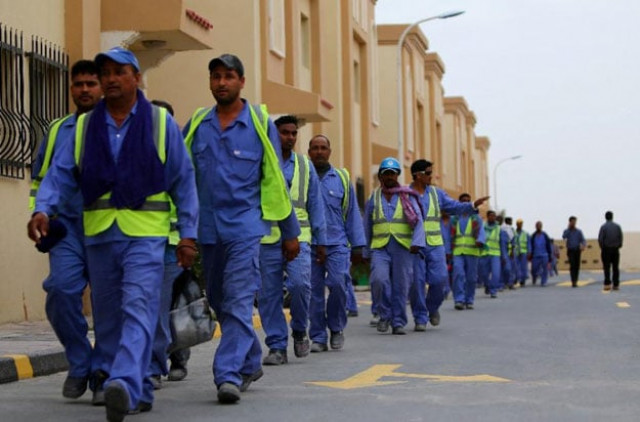Qatar arrests BBC journalist on government press trip
Mark Lobel said he and three colleagues were arrested in Doha as they tried to film a group of Nepalese labourers

Doha has vowed to end the controversial kafala system, under which foreign workers must have a Qatari sponsor -- which critics have likened to modern-day slavery. PHOTO AFP
Mark Lobel, a BBC business correspondent based in Dubai, said he and three colleagues were arrested in the capital Doha as they tried to film a group of Nepalese labourers earlier this month.
Lobel said they spent two nights in prison and he was then prevented from leaving the country for almost a week.
No charges were laid against the BBC crew but their equipment and belongings were confiscated and have not yet been returned.
Read: Suppressed voices: Remembering the struggle of journalists in 1977
Lobel wrote on the BBC News website that the arrest was "dramatic".
"Suddenly, eight white cars surrounded our vehicle and directed us on to a side road at speed," he said.
"A dozen security officers frisked us in the street, shouting at us when we tried to talk. They took away our equipment and hard drives and drove us to their headquarters.
"Later, in the city's main police station, the cameraman, translator, driver and I were interrogated separately by intelligence officers. The questioning was hostile."

Qatar has promised to build seven "cities" to house 250,000 migrant labourers working on projects for the 2022 World Cup. PHOTO AFP
It is the second time in weeks that Qatari authorities have detained journalists attempting to report on the living conditions of the Gulf emirate's large migrant workforce.
In March, a German television reporter and colleagues were held while filming in an area of Doha where many labourers live.
The arrests have come as Qatar is engaged in a public relations drive to try to counter international criticism of its treatment of migrant workers.
After their release the BBC crew were allowed to join the official press tour, organised by a London-based public relations company, Portland Communications.
Read: Al-Jazeera journalist arrested for flying drones to appear in Paris court next week
Government Communications Office chief Saif Al-Thani accused Lobel of breaking Qatari laws and making "himself the story".
Thani said that without waiting for the government's scheduled tour, the BBC crew had tried to break into a workers' camp at night.
"In doing so, they trespassed on private property, which is against the law in Qatar just as it is in most countries," he said in a statement.
"By trespassing on private property and running afoul of Qatari laws, the BBC reporter made himself the story. We sincerely hope that this was not his intention."
In response, the BBC said in a statement: "We are pleased that the BBC team has been released but we deplore the fact that they were detained in the first place.
"Their presence in Qatar was no secret and they were engaged in a perfectly proper piece of journalism.
"The Qatari authorities have made a series of conflicting allegations to justify the detention, all of which the team rejects."
The organisation added that it was "pressing the Qatari authorities for a full explanation and for the return of the confiscated equipment".

Qatar is trying to counter international criticism of its treatment of migrant workers. PHOTO AFP
Human Rights Watch's Gulf researcher, Nicholas McGeehan, wrote on Twitter that Qatar's arrest of the BBC team was "jaw-droppingly awful PR".
Read: Voicing concerns: Journalists demand arrest of men behind Express workers’ killings
The Qatari government has said in recent weeks that it is improving conditions for migrant labourers.
It has introduced a wage protection system to ensure workers get paid on time and is building several new residential neighbourhoods to improve living conditions.
It has also said it is soon likely to end the controversial kafala system, under which foreign workers must have a Qatari sponsor, which critics have likened to modern-day slavery.
Campaign group New FIFA Now said on Monday that it has sent letters to eight of world governing body FIFA's sponsors -- Adidas, Gazprom, Hyundai, Kia, McDonald's, Budweiser, Coca-Cola and Visa -- urging them to speak out about working conditions in Qatar.
"FIFA has blood on its hands, as do these sponsors, for as long as they turn a blind eye to what's going on there," British member of parliament Damian Collins, who is backing the campaign, said in London.
"If McDonald's beef cattle lived in those conditions, you wouldn't buy their burgers."



















COMMENTS
Comments are moderated and generally will be posted if they are on-topic and not abusive.
For more information, please see our Comments FAQ